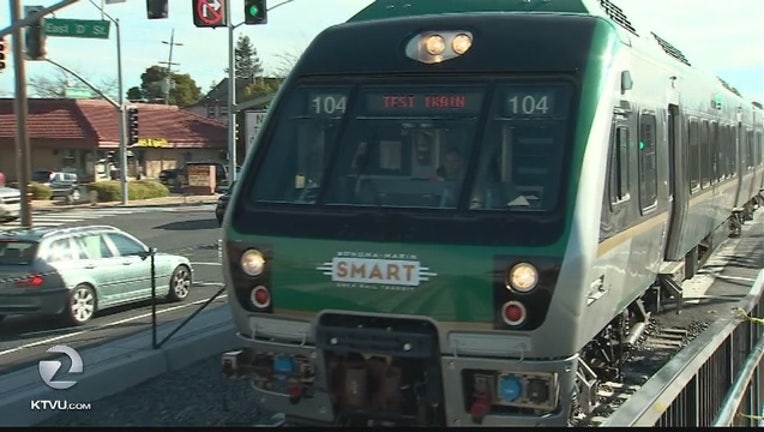New SMART train service may reduce Bay Area commute costs, stress

SAN FRANCISCO (KTVU) -- The North Bay's new passenger rail service is expected to debut this spring and there are some new figures on how much it will cost local riders to use the mass transit option.
Officials with Sonoma-Marin Area Rail Transit, or SMART, say once the trains start rolling this spring, ridership will be free until July 4 and half-price until Labor Day.
"That will give people a chance to try out the service and see what we're like," said Jeanne Mariani-Belding, spokeswoman for the transit agency.
The rail transit service was approved in 2008 and calls for a service zone that will include 43 miles of track.
"I'm looking forward to trying that," said Zina Beck, who commutes through the region on Highway 101. "Absolutely, yes."
Drivers like Beck say the rail system will help them say farewell to the infamous traffic gridlock on the 101 freeway.
"Highway 101 is what I call, kiddingly, our market plan," said Farhad Mansourian, SMART's general manager.
Said Beck: "It will be more convenient for me timewise. I commute all the way from Santa Rosa into Novato and it takes me 2 hours."
The fare of riders who use the service will be based on zones.
The cheapest full fare one-way ride costs $3.50 and goes up to a $19 maximum.
One of the most expensive fares involves a journey from Santa Rosa to the Larkspur ferry then a transfer to the Golden Gate ferry into San Francisco with a transfer on a Muni bus. That roundtrip could top out at $60 a day, which could be a deal killer for many commuters.
SMART executives came up with an option to address that cost.
"Our board of directors approved a plan for a monthly pass," said Mariani-Belding.
The monthly pass includes unlimited rides for a seven day week and costs $200 a month, Mariani-Belding said. And passengers who want to get the cheapest price should buy the SMART pass, use a Clipper card for a ferry discount and get a Muni Fast past.
That approach will cut the daily round-trip commute to about $28 and shorter commutes will cost less.
Riders who use the service will get free Wi-Fi, snacks on the train and ferry and beverage service.
SMART passengers won't pay bridge tolls, fuel costs, parking fees and will skip the stress and anger from dealing with daily commuter traffic.
"We will get you to your destination on time, every time and it's congestion free," Mariani-Belding said.
The SMART train service will emphasize crossing safety to educate motorists who may need to get accustomed to seeing the new passenger rail cars.
By KTVU reporter Tom Vacar.

